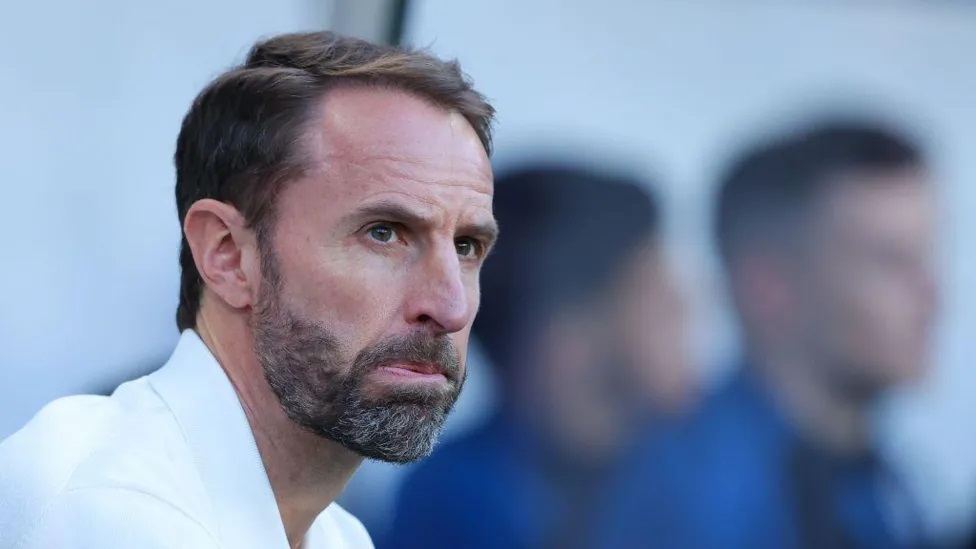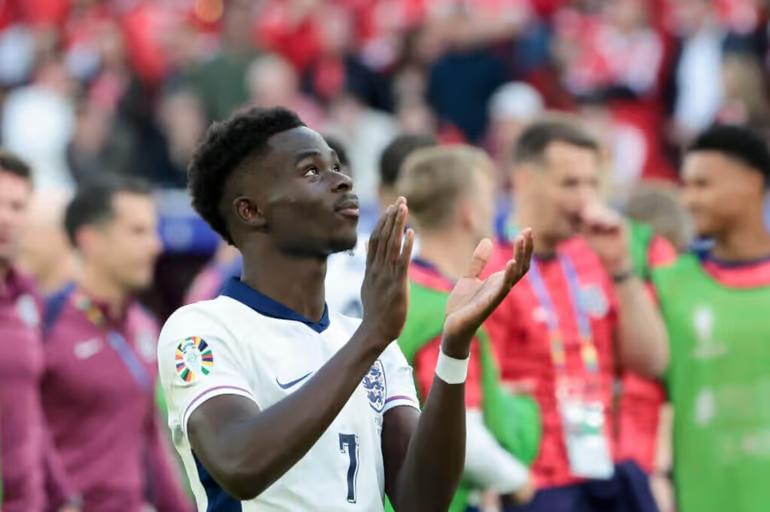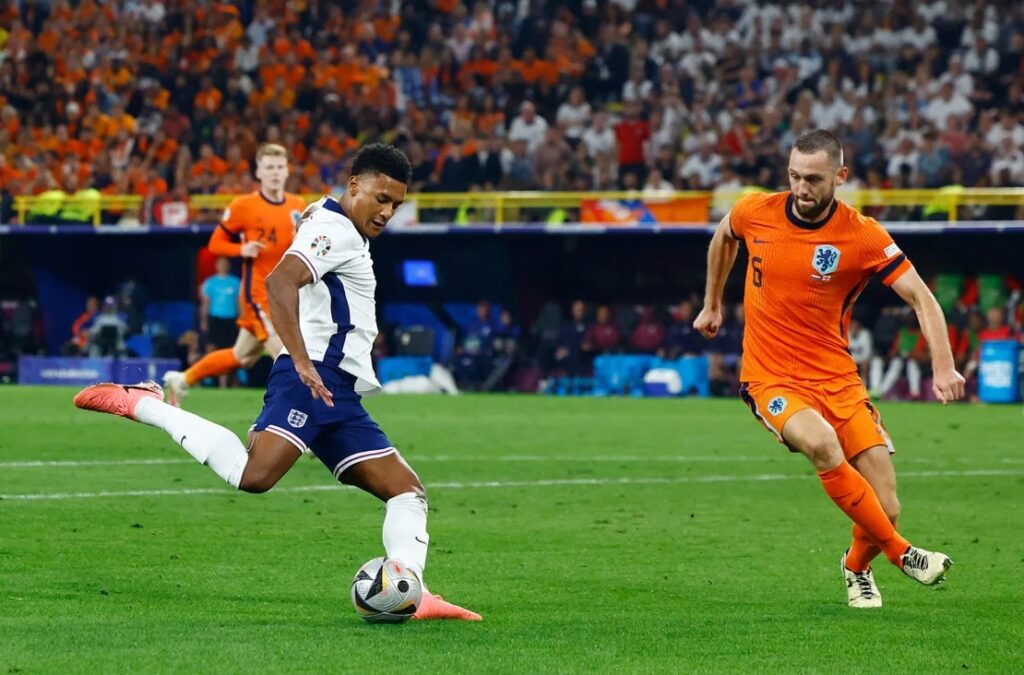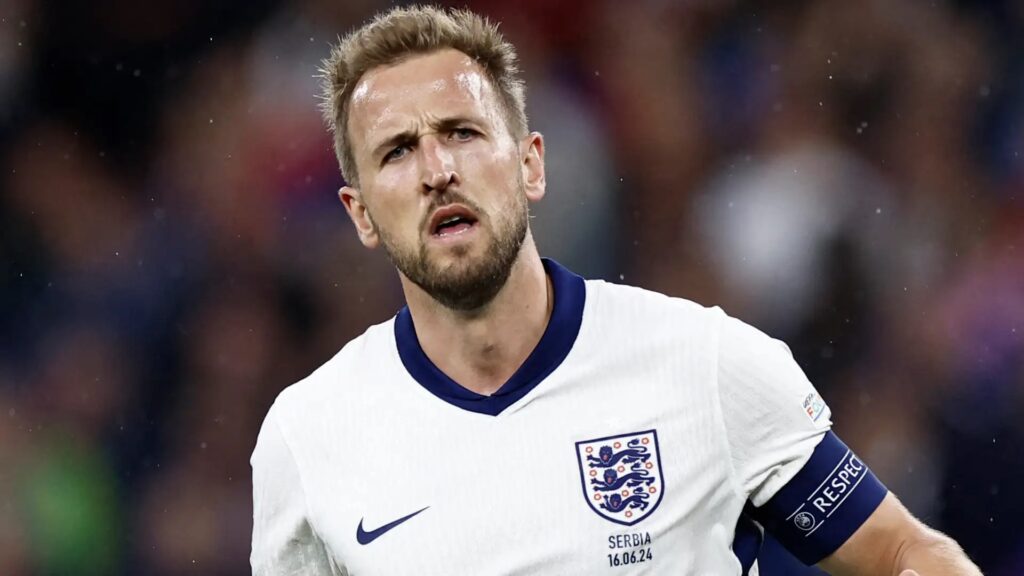Gareth Southgate’s England in Euro 2024 is a paradoxical success story that captivates fans and pundits. As a fervent supporter, I’ve experienced the rollercoaster of emotions that has defined England’s journey in Euro 2024. From tactical dilemmas to moments of individual brilliance, the journey to the final has been anything but straightforward.
Gareth Southgate’s tenure as England manager has always been characterized by a cautious, defensive approach. This philosophy has often drawn criticism, especially given the wealth of attacking talent at his disposal.
As Euro 2024 unfolded, this tension between defensive solidity and attacking potential became increasingly apparent. The group stages showcased this paradox, with England delivering performances that were solid but far from spectacular.

In our opening game against Serbia, a 1-0 victory set the tone for a campaign defined by narrow margins and tactical conservatism. Watching that match, I felt a mixture of relief and frustration. The victory was a positive start for England in Euro 2024, but the lack of attacking verve was concerning. This pattern continued with a 1-1 draw against Denmark, a match that epitomized Southgate’s risk-averse approach. The team looked cautious, almost afraid to commit too many players forward, and the result was a dull, uninspiring game.
The final group match against Slovenia saw a goalless draw, and England advanced to the knockout stages. However, the overall performance still lacked the creativity and dynamism that many fans, including myself, had hoped for. Despite these frustrations, the team had managed to navigate the group stage without conceding a goal.
As the knockout stages approached, the tension between cautious pragmatism and the need for more adventurous football reached a boiling point. The round of 16 clash with Slovakia was a prime example. After taking the lead through a Harry Kane penalty, England seemed content to sit back and absorb pressure. This passive approach nearly cost us, with Slovakia equalizing late on and forcing the game into extra time. It was only a moment of brilliance from Jude Bellingham, with a stunning overhead kick in the dying moments of extra time, that saved England and secured a 2-1 victory. Watching that goal, I couldn’t help but wonder how much further this team could go if given the freedom to play with more attacking intent.

The quarter-final against Switzerland was another nerve-wracking affair. England took the lead through Bukayo Saka, whose perfect shot in the 80th minute was a rare moment of attacking quality. However, the match once again highlighted the team’s tendency to retreat into a defensive shell after scoring. Switzerland equalized, and the game went to penalties. The shootout was a test of nerves, and England’s players, particularly those of Afro-Caribbean descent, faced immense pressure given the racial abuse that had followed missed penalties in the past. Watching Saka, Palmer, Bellingham, Toney, and Alexander-Arnold step up and convert their penalties was both inspiring and nerve-wracking. The way they handled the intense pressure showcased their inner strength and resilience.

The semi-final against the Netherlands brought yet another dramatic chapter to England’s Euro 2024 story. Early on, Xavi Simons’ long-range effort put the Dutch ahead, and once again, England found themselves in a position where they had to chase the game. Kane’s equalizer from the penalty spot was a relief, but it was the substitutions that ultimately turned the tide. Ollie Watkins and Cole Palmer, both having spent most of the tournament on the bench, combined for the decisive goal in injury time. Watkins’ low shot past Bart Verbruggen, set up by Palmer’s precise pass, was a moment of pure elation. As Watkins celebrated, I felt a surge of pride and joy, knowing how much this moment meant to him and the team.
Reflecting on Southgate’s tactical decisions, it’s clear that his cautious approach has both helped and hindered England’s progress in Euro 2024. His emphasis on defensive organization has provided a solid foundation, but it has often stifled the team’s attacking potential. The reliance on moments of individual brilliance, such as Bellingham’s overhead kick and Watkins’ late winner, has been a double-edged sword. While these moments have kept England’s hopes alive, they have also masked the underlying tactical issues that have plagued the team.

Harry Kane’s role in this tournament has been another point of contention. Despite his status as England’s all-time top scorer in knockout games at the Euros, Kane’s performances have been hampered by a lingering back injury. His movement has often appeared labored, and his lack of sharpness has been evident.
Yet, Southgate’s loyalty to Kane has remained unshaken, reflecting his belief in the striker’s ability to deliver in crucial moments.
Kane’s penalty against the Netherlands and his leadership on and off the pitch have been vital, but his struggles have raised questions about whether fresher options like Watkins and Toney might offer more.

Bukayo Saka has been one of England’s standout players in Euro 2024, showcasing resilience and skill throughout the tournament. His journey from the heartbreak of the Euro 2020 final to becoming a key figure in this campaign has been inspirational.
Saka’s equalizer against Switzerland and his composure in the penalty shootout were defining moments, reflecting his growth and maturity as a player.
Jude Bellingham’s performances have been another highlight. His ability to control the tempo of the game and his vision on the ball have made him a key player in England’s midfield.
Bellingham’s overhead kick against Slovakia was a moment of pure genius, showcasing his athleticism and creativity.
His maturity beyond his years has been evident in his consistent performances, making him one of the most exciting young talents in Euro 2024.
Ollie Watkins’ heroics in the semi-final against the Netherlands demonstrate his perseverance. Despite limited game time, Watkins seized his opportunity when it mattered most. His goal, set up by Palmer, was the culmination of weeks of hard work and patience. Watkins’ path from lower league football to scoring crucial goals for England highlights his determination and resilience.
Cole Palmer role in Euro 2024, though limited, has been significant. His assist for Watkins’ winner showcased his vision and composure under pressure. Palmer’s ability to make an impact off the bench has been crucial, and his performances suggest a bright future for him in the national team.
Ivan Toney has also been a valuable asset, providing crucial moments off the bench. His impact in the knockout stages, particularly his composed contributions against Slovakia and Switzerland, has been noteworthy. Toney’s ability to create chaos in the opposition defense and maintain composure in critical moments has made him a key substitute for Southgate.
Trent Alexander-Arnold’s versatility and skill have been vital for England throughout Euro 2024. His ability to play in multiple positions and deliver pinpoint crosses has added a new dimension to England’s play.
His penalty in the shootout against Switzerland was crucial, demonstrating his composure under pressure.
Alexander-Arnold’s technical ability and football intelligence have made him a key player for Southgate.
Phil Foden has been one of England’s most creative players, particularly in the first half of games. His ability to find space, manipulate the ball, and create scoring opportunities has been invaluable. Despite being substituted late in the semi-final against the Netherlands, Foden’s contributions throughout Euro 2024 have been significant. His performances have been a blend of flair and effectiveness, making him a crucial part of England’s attacking unit.
Declan Rice’s role as a midfield anchor has been essential for England’s stability and control in games. Despite his early mistake leading to Xavi Simons’ goal against the Netherlands, Rice’s ability to recover and dictate the pace of the game has been vital. His pass to start the move for Watkins’ goal showcased his vision and composure. Rice’s defensive solidity and ability to transition play have been key components of England’s strategy in Euro 2024.
Kieran Trippier and Luke Shaw have both played important roles in England’s defensive setup. Trippier’s experience and defensive acumen have been crucial, while Shaw’s introduction in the second half against the Netherlands added a new dimension to England’s play. Shaw’s ability to push forward and deliver crosses has been a valuable asset, and his substitution for Trippier signified a tactical shift towards a more attacking approach.
Kobbie Mainoo’s emergence in Euro 2024 has been a pleasant surprise. The young Manchester United midfielder has shown maturity and composure beyond his years. His ability to control the midfield and maintain possession has been impressive.
Mainoo’s involvement in the semi-final against the Netherlands, particularly his role in the buildup to Watkins’ goal, highlighted his potential and importance to the team.

As we head into the final against Spain, the collective contributions of these players will be crucial. Each has played a part in England’s journey in Euro 2024, and their resilience, skill, and determination have brought us to the brink of glory.
It’s clear that this England team is more than the sum of its parts, and there’s a collective hope that they can seize this historic moment. Southgate’s cautious approach, while often criticized, has brought us to the brink of glory.
The role of substitutes like Watkins and Palmer has highlighted the importance of having a squad capable of stepping up when it matters most. As we prepare for the ultimate test against Spain, there’s a sense of pride and anticipation among fans. This journey, with all its ups and downs, will be remembered for years to come. Now, it’s up to Southgate and his squad to seize this historic moment in England’s Euro 2024 campaign.






